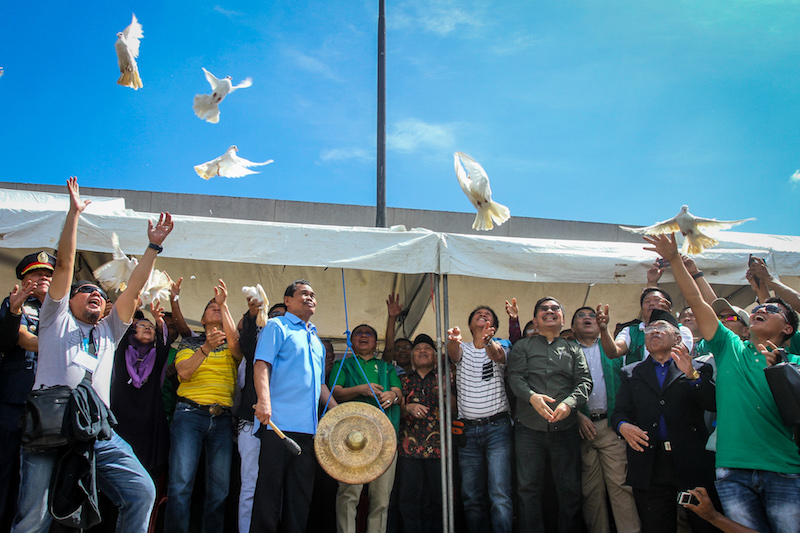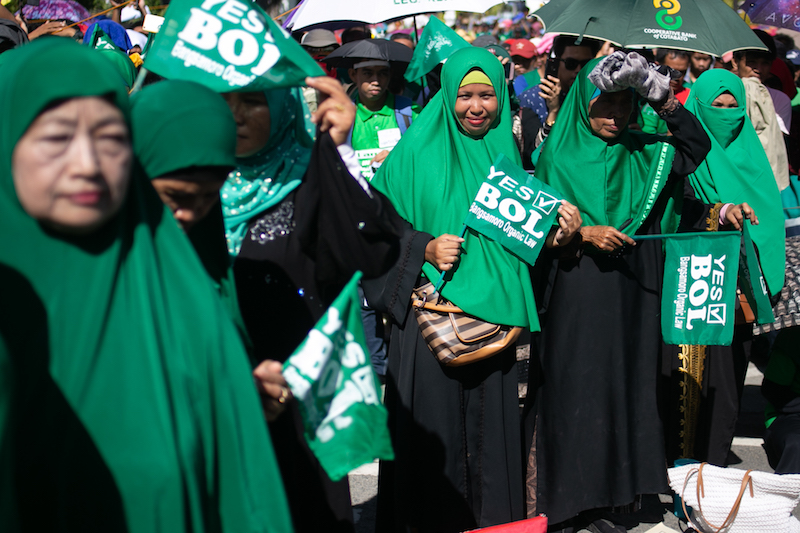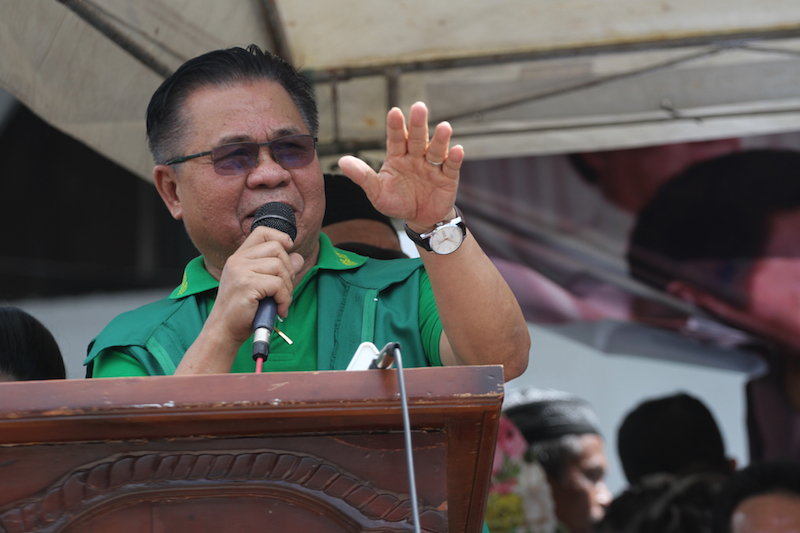COTABATO CITY (MindaNews / 10 December) — The campaign period for the plebiscite to ratify RA 11054 or the Bangsamoro law began Friday but the Peace Implementing Panels of the Government (GPH) and Moro Islamic Liberation Front (MILF) opted for an “official launch” of the campaign Monday inside the compound of the Autonomous Region in Muslim Mindanao (ARMM), the 28-year old institution that would be abolished upon the ratification of the law creating the Bangsamoro Autonomous Region in Muslim Mindanao (BARMM).
Thousands of delegates from the Moro Islamic Liberation Front (MILF) and Moro National Liberation Front (MNLF) traveled from the islands and mainland Mindanao to be part of the historic event, no longer at the MILF’s Camp Darapanan but the ARMM compound in Cotabato City.
It was the first time Al Haj Murad Ebrahim, chair of the Moro Islamic Liberation Front (MILF) entered the ARMM compound (referred to here as the ORG Compound for Office of the Regional Governor since 1990 and before that, ORC for Office of the Regional Commissioner since the late 1970s).
“First time kong pumasok sa compound ng ARMM,” Murad, who quit engineering school to become a revolutionary in the early 1970s, told MindaNews.
 MILF Peace Implementing Panel chair Mohagher Iqbal strikes the gong while MILF chair Al Haj Murad Ebrahim (in green, center) and other Bangsamoro leaders release doves during the formal launch of the campaign for the Bangsamoro Basic Law inside the ORG Compound of the Autonomous Region in Muslim MIndanao in Cotabato City on December 10, 2018. MindaNews photo by MANMAN DEJETO
MILF Peace Implementing Panel chair Mohagher Iqbal strikes the gong while MILF chair Al Haj Murad Ebrahim (in green, center) and other Bangsamoro leaders release doves during the formal launch of the campaign for the Bangsamoro Basic Law inside the ORG Compound of the Autonomous Region in Muslim MIndanao in Cotabato City on December 10, 2018. MindaNews photo by MANMAN DEJETO
Murad is the MILF’s nominee for Chief Minister of the 80-member Bangsamoro Transition Authority (BTA) that President Rodrigo Duterte will appoint to run the Bangsamoro during the three-year transition period until the first set of officials is elected and sworn in on June 30, 2022 on the inaugural of the Bangsamoro government.
The Comprehensive Agreement on the Bangsamoro, the peace agreement signed by government and the MILF in March 2014, provides for an MILF-led BTA.
On December 7, Day 1 of the 45-day campaign period, Murad in a statement said “a Yes vote is a vote for peace, justice, and progress, while a No vote is a vote for uncertainty.”
The plebiscite will be held on January 21 in the proposed core territory of the future BARMM, covering the ARMM’S Basilan, Sulu, Tawi-tawi, Maguindanao and Lanao del Sur and the cities of Marawi and Lamitan — and the cities of Cotabato and Isabela.
On February 6, voters in Lanao del Norte and North Cotabato will troop to the polls to vote for or against inclusion of the six Lanao del Norte towns and 39 barangays in six North Cotabato towns that voted for inclusion in the proposed expanded ARMM in 2001.
Voters in the other areas that petitioned for inclusion in the future BARMM will also vote that day.
Office of the Bangsamoro People
“Welcome na welcome po kayo rito. Sa inyo ang complex na ito, (You are very much welcome here. This complex is yours), ARMM Governor Mujiv Hataman addressed the crowd dressed in mostly MILF and MNLF green.
Before the rally started, Hataman had welcomed Murad, MILF Peace Implementing Panel chair Mohagher Iqbal and Muslimin Sema, former chair of the Moro National Liberation Front (now chair of the Bangsamoro National People’s Congress) at the conference hall. Iqbal told MindaNews he had been to the ARMM a few times under the Hataman administration but it was Murad’s first time to set foot in that four-decade compound.
“Kung ipinagbabawal kayo sa ibang area ng Cotabato, dito ho, bukas na bukas ito para sa inyo” (If you are barred in other areas in Cotabato, here you are all welcome), Hataman said as he pointed to the change of name to ‘Bangsamoro Complex’ in lieu of ORG and how he replaced the signage at the landing on the second floor from Office of the Regional Governor to Office of the Bangsamoro People.
Earlier reports said the rally was supposed to be held in the plaza in downtown Cotabato City but the city government allegedly did not issue a permit. But Mayor Cynthia Guiani-Sayadi, who is campaigning for a No vote, told MindaNews no application for a permit was filed.
Hataman acknowledged the people’s sacrifices and why the Bangsamoro law should be ratified, and looked forward to a new government that would no longer beg for its budget as he had done so in the five years he has been ARMM Governor.
He also noted that the rally was timely as it was International Human Rights Day, linking this up with their long struggle to assert their right to self-determination.
Blood, sweat and tears
Iqbal reiterated that the Bangsamoro law is a product of the blood, sweat and tears of the Moro people but is not just for the Moro but for settler and IP (Indigenous Peoples) communities as well.
Tan, chair of the government’s Peace Implementing Panel, reiterated the Bangsamoro government won’t have to beg for its budget anymore. Tan was an Assemblyman representing Sulu in the first ARMM administration (1990-1993) and was Vice Governor in the second.
 Supporters gather in the compound of the Autonomous Region in Muslim Mindanao (ARMM) in Cotabato City on Monday, 10 Dec. 2018, to formally launch the campaign to vote Yes in the plebiscite on Jan. 21 and Feb. 6, 2019. The ratification would pave the way for the creation of the new region that would replace the ARMM. MindaNews photo by MANMAN DEJETO
Supporters gather in the compound of the Autonomous Region in Muslim Mindanao (ARMM) in Cotabato City on Monday, 10 Dec. 2018, to formally launch the campaign to vote Yes in the plebiscite on Jan. 21 and Feb. 6, 2019. The ratification would pave the way for the creation of the new region that would replace the ARMM. MindaNews photo by MANMAN DEJETO
Upi Mayor Ramon Piang spoke on behalf of the IPs, Cardinal Orlando Quevedo sent Fr. Clifford Baira to represent him at the rally, Bainon Karon spoke for the women, Marjanie Mimbantas for the Youth Sector, Abdulrauf Macacua for the Bangsamoro Transition Commission. Philippine National Police Chief Oscar Albayalde sent a representative but there was no representative from Armed Forces Chief of Staff Gen. Carlito Galvez who declared the “end of war” with the MILF during his visit in the MILF’s Camp Darapanan in October.
Curiously, the program did not include a message from civil society’s peace networks, the groups that pushed both government and the MILF to return to the negotiating table during deadlocks in the talks and helped push for the retention of provisions of the draft Bangsamoro law into what is now RA 11054, especially during the crucial bicameral conference committee phase.
Long journey
The business sector, however, was represented by three speakers: Kahal Nul for the Moro, Pete Marquez for the settlers and Narciso Yu Ekey for the Chinese community. Nul said the Bangsamoro law would bring peace, development and unity; Marquez greeted the crowd with “Magandang Bangsamoro sa inyong lahat,” and Yu Ekey said “the very elusive peace is now within our reach.” He also emphasized that with the BOL, as how the Bangsamoro law is referred to, business “ay sisisbol” will progress.
Sema began on an emotional note, acknowledging people who were with him in at least four decades of the Moro liberation fronts’ 50-year journey.
“We are all marching for peace. .. finally the answer is already here,” he said as he explained the law now no longer provides for a sham autonomy but a full and more inclusive autonomy, that it does not divide but unite, that it acknowledges past mistakes committed against the Moro people with willingness to correct these historical injustices.
“The fight is handed down to us to make a decision come January 21… the moment is here, the time is now,” he said.
 MILF chair Al Haj Murad Ebrahim delivers the keynote speech during the formal launch of the campaign for the Bangsamoro Basic Law inside the ORG Compound in Cotabato City on December 10, 2018. MindaNews photo by MANMAN DEJETO
MILF chair Al Haj Murad Ebrahim delivers the keynote speech during the formal launch of the campaign for the Bangsamoro Basic Law inside the ORG Compound in Cotabato City on December 10, 2018. MindaNews photo by MANMAN DEJETO
Murad’s 31-minute speech retraced the history of the Bangsamoro struggle and how now is “maybe the last chance for peace.”
Before the leaders onstage set free doves after sounding the gong, the crowd listened to a video message from President Duterte, audible but not visible on screen in the noonday sun.
Duterte said the peace process in Mindanao is at a crucial stage. “The threat of terrorism is still high, poverty is a constant reality, and the feeling of neglect is still persistent among Mindanawons.”
“As your President and a Mindanawon myself, I am witness to the conflict in Mindanao. I am appealing to everyone to take part, active part in promotion of the Bangsamoro Organic Law and in the areas of governance and authority. Let us ratify this law and give it a chance. Mindanao deserves its peace. Help me realize that aspiration. So yes to the Bangsamoro Organic Law,” the President said. (Carolyn O. Arguillas / MindaNews)
